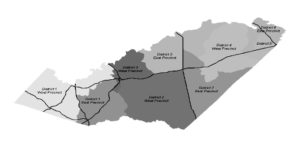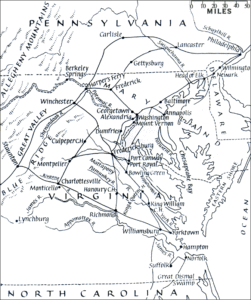Adapted by Keswick Life
 In July, the Orange County Supervisors authorized staff to draft a comprehensive zoning classification for Montpelier at the request of Montpelier leadership, including the Montpelier Foundation’s CEO/President Kat Imhoff and COO Sean O’Brien.
In July, the Orange County Supervisors authorized staff to draft a comprehensive zoning classification for Montpelier at the request of Montpelier leadership, including the Montpelier Foundation’s CEO/President Kat Imhoff and COO Sean O’Brien.
 On Thursday evening (Dec. 1), the Orange County Planning Commission held the first formal public hearing on the proposed Montpelier District—a site-specific zoning classification that would allow the National Trust for Historic Preservation property to pursue agri-tourism economic development opportunities.
On Thursday evening (Dec. 1), the Orange County Planning Commission held the first formal public hearing on the proposed Montpelier District—a site-specific zoning classification that would allow the National Trust for Historic Preservation property to pursue agri-tourism economic development opportunities.
According to the Orange County Department of Planning and Zoning, the purpose of the district is two-fold: to reasonably permit Montpelier to conduct operations which align with its mission—especially in light of its importance in generating tourism income and exposure for the county—and to allow Montpelier to capitalize on the findings and recommendations of a grant-funded study assessing economic development opportunities at the county’s premier property. The proposed district would apply to more than 2,000 acres the Montpelier Foundation operates and would permit Montpelier to diversify operations that align with its mission of “transforming James Madison’s historic estate into a dynamic cultural institution engaging the public with the enduring legacy of Madison’s most powerful idea: government by the people.” The proposed Montpelier District also would bring several of Montpelier’s current operations—such as the visitors’ center, Exchange Café and Center for the Constitution classrooms—into county zoning compliance.
The December 1 hearing is the first of two required public hearings, but represents the latest in an ongoing dialogue between Montpelier officials, county staff, planning commission members and citizens.The district also could position Montpelier to supplement its own revenue stream while supporting county tourism-related economic development.
This is a new idea in Orange County and citizens have expressed concerns about Montpelier essentially authoring its own zoning district, the impact new development could have on Rt. 20 traffic and the possible permitted uses within such a large and historic site. They’ve wondered how much revenue any potential new agri-tourism businesses actually would generate for the property and what specific projects Montpelier might pursue with its own zoning district? They’ve consistently questioned the proposal’s urgency.
A site-specific zoning district is a complex and fascinating prospect for both Montpelier and the county, understandably there are concerns and questions. But surely a healthy Montpelier benefits all—particularly as a prestigious, agri-tourism and intellectual industry with a diverse local, national and international audience.In an effort to expand agritourism opportunities at its 2,600-acre property while still maintaining its historical and environmental character, Montpelier is working with the county to establish a unique zoning classification for the county’s most popular attraction. Currently, the property which houses James Madison’s mansion, a visitor’s center, trails, gardens and the Robert H. Smith Center for the Constitution, is zoned agricultural which limits future uses for the property.
Revisiting the property’s zoning would assure Montpelier is in compliance with county zoning, but also ensure Montpelier can pursue opportunities to benefit not only Montpelier but the county, O’Brien added. Those findings were presented to the supervisors earlier this year and included recommendations such as a boutique hotel with event space, a farm brewery and continual assessment of agricultural opportunities.
In September, Orange County Planning and Zoning Director Josh Frederick presented the supervisors with a proposed draft of the MD during a work session. The text was the collaborative effort of Frederick, the county administrator, the county attorney, the director of economic development and Montpelier leadership.Frederick said the property’s historical significance makes this a unique process that been a collaborative effort between the county and Montpelier to ensure the language aligns with Montpelier’s mission and long-term goals.
Orange County Administrator Bryan David said the proposed zoning classification would be specific to Montpelier and not available to any other properties in the county.“The National Trust for Historic Preservation, which is actually the owner of the land, has looked at it [the proposed MD] and felt very comfortable with it,” David said. “In fact, they held it out as they wish they could have this for some of its other properties across the nation.”
Thomas Jefferson’s Monticello went through a similar process in Albemarle County when Imhoff was COO there.In a letter to the supervisors, Imhoff said the report completed by Virginia Tech had provided good and sound guidance for opportunities that may best fit Montpelier’s mission while maintaining its rural character. Montpelier’s current agricultural zoning classification isn’t well-positioned to meet its future needs, she added.
O’Brien said the MD language has gone through several revisions at Montpelier’s request.
“We went back to them and said ‘here are some things we think are actually too open and we’d like to restrict it a little bit.’ We want to protect Orange County’s character and we want to protect Montpelier’s character for the future, so we don’t want to have things be as open as they were in the initial draft,” he said. “That’s where things like the language associated with design standards got added or got changed. We’re talking about this widely with supporters, donors, board members and everybody in the area on how this will help Montpelier meet its educational goals and financial goals and then contribute more to the Orange community.”
Montpelier has also discussed the proposed zoning language with the Piedmont Environmental Council, he added.


